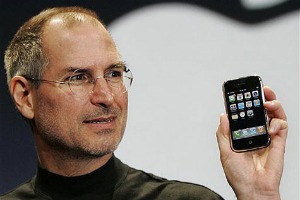Most American business leaders are about as beloved as people in Congress during the current economic turmoil. This is mostly due to the gigantic CEO compensation and golden parachutes these business leaders receive when everyone else is struggling. Yet the public admired Steve Jobs, founder of Apple, who died of cancer just last week is a stark contrast to these other business leaders.
Jobs was not loved due to his acts of charity or sparkling personality. He performed very little philanthropy compared to his technological contemporary, Bill Gates. Many accounts show that he was not fun to work with, and he humiliated those whom did not meet his expectations.
Rather, Jobs is loved because he was proclaimed as a great business visionary because of his story of success, which strikes the emotional chords of believers of the American dream. Jobs started as a college drop-out who sold his Volkswagen van to create the first personal computer in his parents’ garage with his friend Steve Wozniak. A new era of innovative technology had begun.
The distinguishing factor that separates those who succeed from others is that they learn as much from their failures as they do from their triumphs. It is well-known that Apple gradually fell into Microsoft’s shadow, and many of Apple’s products failed to capture the public’s interest. But Jobs continued to persist, despite these failures.
This persistence led to the renaissance of Apple. Jobs took great risks to make technology more personal and user-friendly. He first achieved this with iTunes and the iPod which rocked the music industry and allowed consumers to purchase a single song rather than a whole CD. Next, the revolutions of communication came into focus with the iPhone and iPad. This propelled Apple up in the business ranks as one of the most successful companies in America.
Jobs provided important lessons for America’s future economy. This country has managed to battle off many economic hardships partly due to its ability to create new industries. This is only possible when the government lets people like Jobs follow their dreams. His success is a result of powerful drive and ingenuity, things which are now all too often choked by government rules and regulations.
Jobs’ career is a perfect example of Say’s Law, which states that supply creates its own demand. Many thought the digital tablet to be unnecessary, since people already had cell phones and computers, but Jobs knew that if he created it, people would buy it.
Nowadays, the government regulates the economy more than ever. But prosperity does not come from government managers and educated economists. It comes from hardworking, inspired people like Steve Jobs. Jobs’ story teaches us that America doesn’t need another bailout. It needs a new product.
Scott Novak is an Opinion Editor for The Patriot and jcpatriot.com



